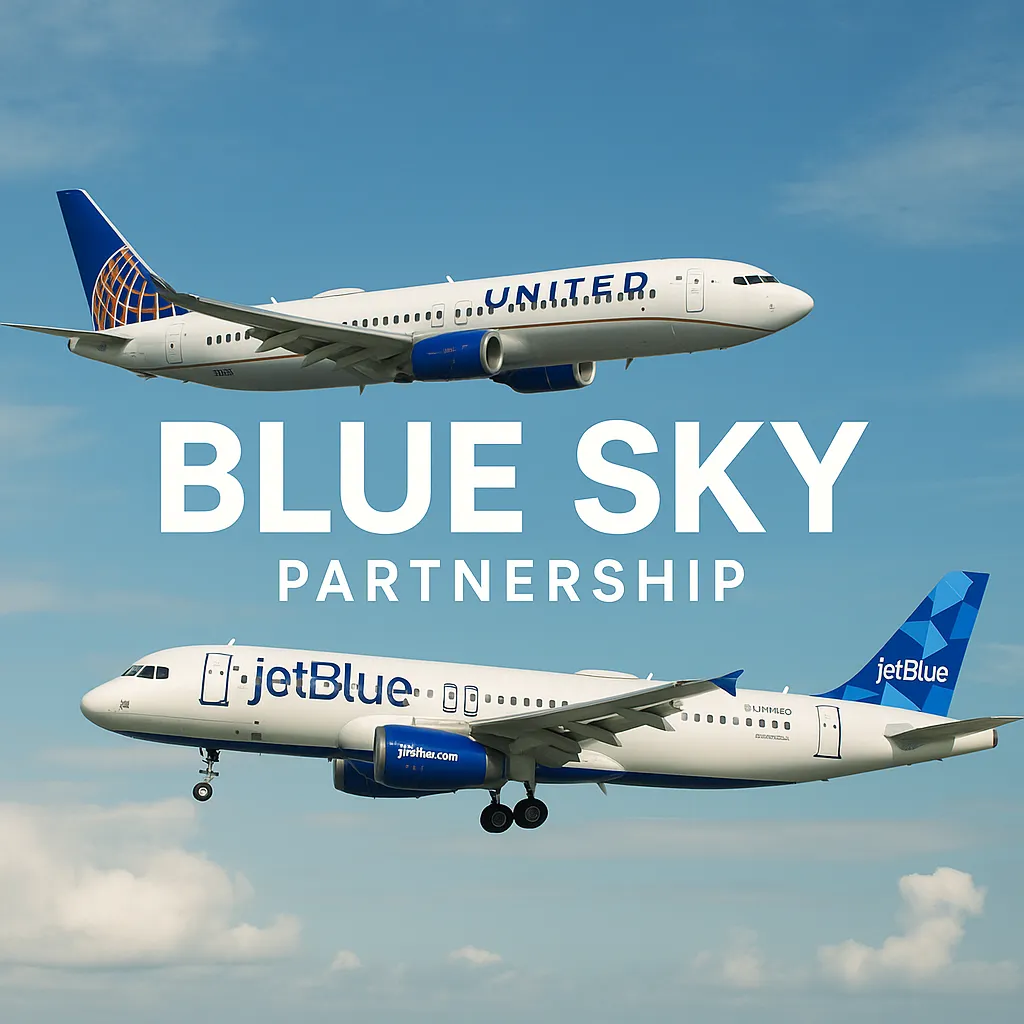
Blue Sky or Bust: Why JetBlue Had to Partner with United
JetBlue just got a lifeline. And not a moment too soon.
Last week, JetBlue and United Airlines announced a brand-new alliance called “Blue Sky,” allowing travelers to earn and redeem miles across both carriers and giving reciprocal elite status perks to loyal flyers. While the headlines focused on what travelers will gain, let’s be clear: this wasn’t just about member benefits.
This was about JetBlue’s survival.
Let’s Talk Rankings (and Reality)
JetBlue isn’t a top-tier player. Not even close.
According to 2023 passenger numbers, JetBlue ranked #6 among U.S. airlines by passengers carried. United was firmly at #3, behind Southwest and Delta.

When you're the sixth-largest airline in an industry that runs on razor-thin margins and ruthless competition, being independent is hard. JetBlue has:
A shrinking domestic footprint
A legal loss with the Department of Justice over its Northeast Alliance with American Airlines
A failed merger attempt with Spirit
Rising costs and increased pressure from Wall Street
In other words, it was either partner up or risk becoming irrelevant.

Why United Said Yes
United didn’t do this out of kindness. They’re playing chess, not checkers.
United gains:
Re-entry into JFK — a move CEO Scott Kirby himself once called "one of the biggest mistakes United ever made" when the airline exited the airport in 2015
Access to JetBlue’s East Coast strongholds
A new loyalty base from JetBlue's customer pool, without the baggage of a merger
It’s a brilliant move for United. They expand reach, bolster brand loyalty, and build a quiet defense against Delta and American in key metro markets like New York, Boston, and Fort Lauderdale.

What Travelers Actually Get
This isn't a codeshare handshake. Blue Sky is a real loyalty partnership. Here's what it means:
🔄 Earn & Burn Flexibility
MileagePlus members can now earn/redeem on most JetBlue flights, including Europe routes.
TrueBlue members gain access to United’s massive global footprint.
👑 Elite Benefits (on both sides)
Mosaic and Premier elites get:
Free first checked bag
Extra legroom seats at check-in (EvenMore or Economy Plus)
Priority boarding & check-in
Same-day flight changes
Lounge access or upgrades? Not yet. But stay tuned.
🧭 Seamless Itineraries
Book one itinerary across both carriers on JetBlue.com or United.com.
Connection cities just got a serious upgrade.
The JFK Comeback
This partnership is also United’s ticket back to John F. Kennedy International Airport (JFK).
As part of the deal, United will take over slots from JetBlue and launch up to seven daily roundtrips from JFK’s new Terminal 6 starting as early as 2027.
It’s a comeback years in the making—Scott Kirby openly admitted that leaving JFK was one of United’s worst strategic blunders. This partnership gives them a second chance to fix that.

This Is JetBlue’s Shot at Staying in the Game
This isn’t just a cool collaboration. This is a make-or-break move for JetBlue.
JetBlue has always been the airline with the cool branding, mood lighting, and free snacks. But style alone doesn’t pay the bills. With this partnership, they gain access to:
Broader international redemptions
A shot at re-entering the loyalty game
A solid strategic partner without the regulatory chaos of another merger
It's clear: JetBlue needed a seat at the table, and United was the last open chair.
Final Boarding Thoughts
This partnership may not feel as massive as an airline merger, but it could be more strategic in the long run. It gives JetBlue what it desperately needed—stability—and gives United a slick advantage in the Northeast.
For travelers? This is a win.
For points and miles nerds? This is a new playground.
And for JetBlue? This might just be its last chance to fly higher before the runway runs out.
Want to see how to best use your JetBlue or United points now?
👉 Join my Airline Points Academy for the inside scoop on how to use these loyalty programs like a pro.
